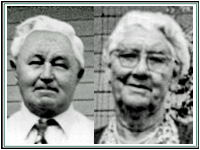|
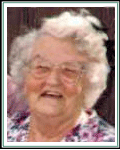 Well here
we are again. It's been an interesting week at the
Depot. We've started cleaning out some of the storage
areas around the museum and have found some long hidden
treasures as well as a lot of junk. We have had several
visitors and I want to tell about one in particular.
Bertha Mae
(Heiden) Drake (left). Mrs. Drake stopped in on
Friday, the 23rd. Well here
we are again. It's been an interesting week at the
Depot. We've started cleaning out some of the storage
areas around the museum and have found some long hidden
treasures as well as a lot of junk. We have had several
visitors and I want to tell about one in particular.
Bertha Mae
(Heiden) Drake (left). Mrs. Drake stopped in on
Friday, the 23rd.
She is from just outside of Phoenix,
Arizona, and receives the Argus regularly and remembers
a few weeks ago my invitation for anyone with a story
about the museum and/or the railroad, to share it with
us. You remember that, don't you? I hope so. Mrs. Drake
brought in a very nice story about her family and the
depot and Shepherd. I want to share that story with you.
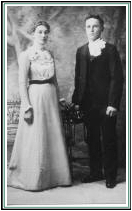 Herman and Fredareka Heiden, my parents, lived
on a farm near
Dundee, Michigan, where they had
been born and grew up. My mother had severe hay
fever and asthma. So, the doctor advised them to
move north for her health. After deciding to
explore this idea, they bought tickets on the
Ann Arbor Railroad to Farwell, Michigan in early
spring 1915. When they arrived, only trees and
lumber mills were there. People told them to go
back to Shepherd, where there was farmland. They
took the "Motor" that ran on the tracks back to
Shepherd where they stayed in a rooming house
overnight. The next morning they rented a horse
and buggy from the livery stable. By word of
mouth, they learned that Frank Meyers (Spikehorn
Meyers) needed someone on his farm which was
north of Shepherd on Millbrook Road. They rented
this farm. Incidentally, the house is still
there. Herman and Fredareka Heiden, my parents, lived
on a farm near
Dundee, Michigan, where they had
been born and grew up. My mother had severe hay
fever and asthma. So, the doctor advised them to
move north for her health. After deciding to
explore this idea, they bought tickets on the
Ann Arbor Railroad to Farwell, Michigan in early
spring 1915. When they arrived, only trees and
lumber mills were there. People told them to go
back to Shepherd, where there was farmland. They
took the "Motor" that ran on the tracks back to
Shepherd where they stayed in a rooming house
overnight. The next morning they rented a horse
and buggy from the livery stable. By word of
mouth, they learned that Frank Meyers (Spikehorn
Meyers) needed someone on his farm which was
north of Shepherd on Millbrook Road. They rented
this farm. Incidentally, the house is still
there.
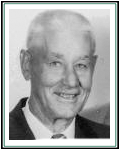 My
parents went back on the Ann Arbor to Dundee. In
the spring of 1915, they moved from Dundee to
Shepherd using the train. They loaded the
furniture and farm machinery, their cows,
horses, buggy and wagon all in box cars. My
father and brother
Lewis
(left) rode the box cars with
the animals to make sure they were calm and
safe. My mother and sister
Nellie (who later
married
Chester Ayris) rode in the passenger
car. My
parents went back on the Ann Arbor to Dundee. In
the spring of 1915, they moved from Dundee to
Shepherd using the train. They loaded the
furniture and farm machinery, their cows,
horses, buggy and wagon all in box cars. My
father and brother
Lewis
(left) rode the box cars with
the animals to make sure they were calm and
safe. My mother and sister
Nellie (who later
married
Chester Ayris) rode in the passenger
car.
In
February of 1918 my parents and sister went to
Dundee for my grandfather's funeral. My brother
was already there visiting cousins. While at the
funeral, the big snowstorm of 1918 hit. The
first train back to Shepherd was packed with
travelers with many people standing. The train
engine and wheels ground through the snow,
slowly moving ahead. My mother was pregnant (I
was born in March) and the conductor was very
concerned that she had a seat. My dad was
anxious to get back since neighbors were
pitching in and helping with farm chores.
My parents
moved from the Meyers farm to the Viegenberg farm
where I was born in March of 1918. As a child, my
parents took many trips from Shepherd to Dundee on
the railroad, since my grandparents and aunts and
uncles lived there. I can remember taking many trips
on the train. Mother had a special basket of food on
the trip. My dad would buy vanilla creme sandwich
cookies for me to eat on the train. That was the only
time I would get store-bought cookies, so it was a
special treat.
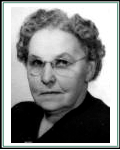 When we would come to the train, a
lot of the horses were afraid of the train because
of the noise. They would rear up and sometimes would
run away. We would wait on the platform and the big
engine would come in roaring loudly with huge wheels
grinding. I was scared but when the conductor yelled
"All aboard", we got on. Then he would yell
"Tickets! Have your tickets ready!", and he would
take them. Before each station he would yell out the
name of the city for the next stop. I was amazed at
the green plush seats that could be turned to face
one another. When we arrived in Dundee station,
Aunt
Lena (right) and Uncle John Koster picked us up in their
buggy. When we would come to the train, a
lot of the horses were afraid of the train because
of the noise. They would rear up and sometimes would
run away. We would wait on the platform and the big
engine would come in roaring loudly with huge wheels
grinding. I was scared but when the conductor yelled
"All aboard", we got on. Then he would yell
"Tickets! Have your tickets ready!", and he would
take them. Before each station he would yell out the
name of the city for the next stop. I was amazed at
the green plush seats that could be turned to face
one another. When we arrived in Dundee station,
Aunt
Lena (right) and Uncle John Koster picked us up in their
buggy.
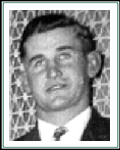 My
parents soon moved to the Zagameirer farm, also
known as the Ruckel place. Here my younger brother
Richard
(left) was born in 1926. This farm is the one I
remember most. In the summer, my two cousins
Alice
and Helma Laas, came on the train to visit us on the
farm in the country for their vacation. They worked
in the office of a wheelbarrow factory in Toledo,
Ohio. They shipped a beautiful metal wheelbarrow to
my dad on the train as a special gift. My dad really
appreciated it and used it in the barn. About this
time, people started using cars for long trips
instead of the train. My parents lived in the
Shepherd area for the rest of their lives. My
parents soon moved to the Zagameirer farm, also
known as the Ruckel place. Here my younger brother
Richard
(left) was born in 1926. This farm is the one I
remember most. In the summer, my two cousins
Alice
and Helma Laas, came on the train to visit us on the
farm in the country for their vacation. They worked
in the office of a wheelbarrow factory in Toledo,
Ohio. They shipped a beautiful metal wheelbarrow to
my dad on the train as a special gift. My dad really
appreciated it and used it in the barn. About this
time, people started using cars for long trips
instead of the train. My parents lived in the
Shepherd area for the rest of their lives.
Now, wasn't
that a great story? I had just started to think about
what to put in this week's article when Mrs. Drake
brought this in. Yes, I do put some thought into what I
write. Now I want to tie this story to our museum. Pay
attention now, because I have decided there will be a
test at the end of the year. Mrs. Drake said her parents
took the "Motor" back from Farwell to Shepherd. Now if
you look at the picture at the top of this article, you
will see the "Motor" parked beside the depot. As I have
said before, this was a McKeen gas Motor Car, also known
as (????, test material) (the Potato Bug). In fact this
most likely is the very car they would have taken. The
picture is from 1922 and Ann Arbor would not have had
more than one in this area. Next tie in, the rooming
house her parents stayed in was the Joslin House. I was
able to show her a picture of the Joslin Boarding House.
The livery
stable where they rented the horse and buggy was most
likely the one where Crawley's Auto Repair is located,
just across the street from the museum. One last tie to
the museum in this beautiful story. While talking in the
telegraph room, Mrs. Drake commented on the Ann Arbor
uniform we have on display. As I explained, she got a
slight smile on her face and asked if l knew who it
belonged to. As I started to say Karl Kipfmueller, she
finished the name for me. It seems she looked after Mr.
Kipfmueller's home for him and watched his children. As
I am sure you remember, Mr. Kipfmueller was the
grandfather of local residents, Gus, Steve and Tom
Recker and Sue Alexander. She said she could remember he
would only be home every other night while working. This
made sense, since we know he worked on the Mt. Pleasant
to Owosso run, he would have spent the night before
catching the run on the following day.
Mrs. Drake,
it was an honor and a pleasure speaking with you on
Friday and I dedicate this article to you and your
family for providing us with such a warm and lovely
family story. See, you too can be a newspaper columnist.
By the way, if anybody has some of those store-bought
vanilla creme sandwich cookies, bring 'em on down to the
museum and I'll call Bertha Mae down and she and I will
get blitzed on a sugar high. See you at the Museum.
The Conductor (Mike Booth) |


